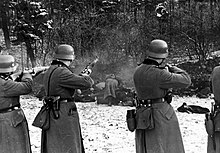Massacre


A massacre is a wholesale indiscriminate killing of persons, and also, in a transferred sense, of animals.[1]
Massacre is "the indiscriminate and brutal slaughter of people or (less commonly) animals; carnage, butchery, slaughter in numbers". It is also used "in the names of certain massacres of history".[2] The first recorded use in English of the word massacre in the name of an event is "Marlowe (c1600) (title) The massacre at Paris",[2] (a reference to the St. Bartholomew's Day massacre). Massacre can also be used as a verb, as "To kill (people or, less commonly, animals) in numbers, esp. brutally and indiscriminately".[3] The first usage of which was "1588 J. PENRY Viewe Publ. Wants Wales 65 Men which make no conscience for gaine sake, to breake the law of the æternall, and massaker soules...are dangerous subjects",[3] It is also used figuratively and idiomatically for events that do not involve any deaths, such as the Saturday Night Massacre, which refers to the firing and resignations of political appointees during the Watergate scandal.
Massacres can be difficult to investigate because they are often done secretly and that the victims may all have been killed and so only the perpetrators survive and are able to bear witness.[4] Some feel that when an urban massacre is initiated by the authorities such as happened in the 1980s in Soweto it is usually not the leadership who dies because they do not usually go out onto the street to demonstrate.[5]
See also
- List of events named massacres
- Mass murder
- Disaster
- Tragedy (event)
- Genocide
- Ethnic cleansing
- Killing spree
References
- ^ Chisholm, Hugh, ed. (1911). . Encyclopædia Britannica (11th ed.). Cambridge University Press.
- ^ a b Oxford English Dictionary Massacre, n.
- ^ a b Oxford English Dictionary Massacre, v.
- ^ Jacques Semelin (2009), "Investigating a massacre", Purify and Destroy: The Political Uses of Massacre and Genocide, Columbia University Press, pp. 376–378, ISBN 9780231142830
- ^ Ronald A. Francisco (2010), "After the massacre", Collective Action Theory and Empirical Evidence, Springer, ISBN 9781441914750
